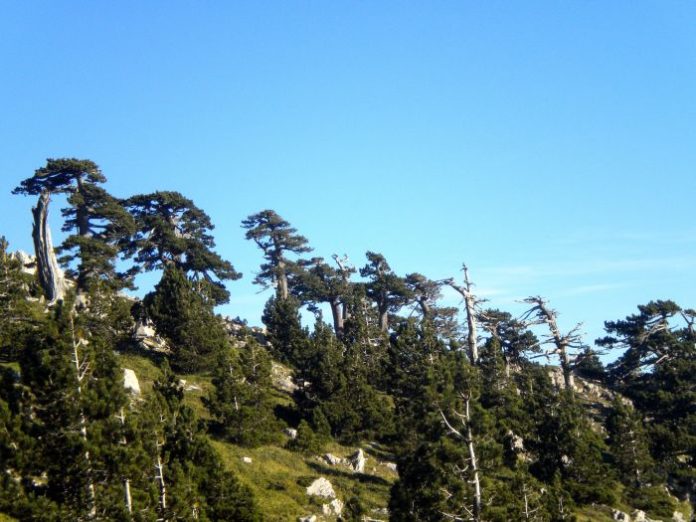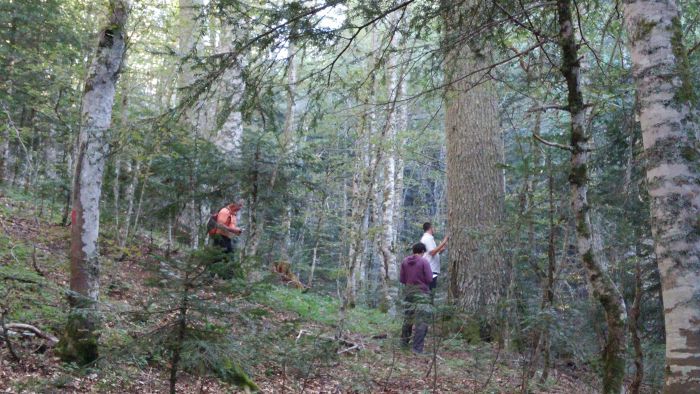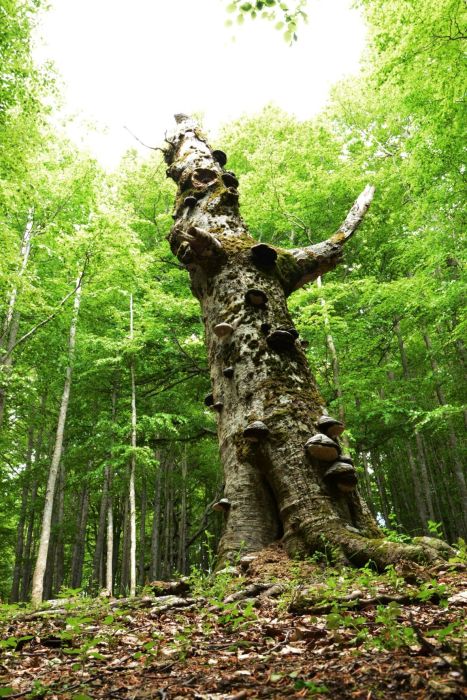
The old-growth forests constitute a heritage of inestimable ecological and environmental value, as they represent small vestiges of how Europe’s past primeval forest may have looked. The characteristics that distinguish an old-growth forest are typical of the final stages of the development of the vegetation, i.e. the presence of plants of considerable size, many of which are senescent, an abundant presence of standing dead trees and dead wood on the ground, an elevated and complex structural heterogeneity, absence of anthropogenic disturbance for many decades and composition of native species.
European old-growth forests are estimated to occupy only 0.7% of the total forested area and that are of prime ecological value, as they represent small vestiges of how Europe’s past primeval forest may have looked. Old-growth mountains forests are dynamic ecosystems characterized by a high level of structural and biological diversity. In addition, old-growth forests provide various and important ecosystem services, such as biodiversity maintenance, long-term carbon storage and landscape uniqueness. These forests represent valuable natural laboratories for evaluating how they respond to global change drivers, including climate warming and land use changes. Therefore, we need to understand how carbon uptake and long-term growth in these ecosystems respond to climate warming. Although there is an increasing attention on these ecosystems, the knowledge about the long-term impacts of climate change in Mediterranean environment is still limited.
A recent study published in Science of The Total Environment, led by Italian and Spanish scientists found that in Mediterranean mountainous area old growth forests exhibit a remarkable resistance to climate warming showing a stable or even more sustained growth at high altitudes, despite the worsening of extreme phenomena linked to climate change and the considerable age of the older trees.
The work examined some of the last remaining stands of old growth forests located in the Pollino National Park, to assess how the growth of young and old conspecific trees has responded to climate change. The Pollino N.P. area represent the largest protected area in Italy, some of the longest-lived trees were found, e.g. Italus (P. leucodermis) with its 1235 years is the oldest dated tree in Europe, also Michele and Tenore of over 620 years, the very old beech trees of the “Pollinello” forest recently declared world heritage. A further example is given by the ancient beech forest of “Cozzo Ferriero”, recognized in 2017 as a “Unesco World Heritage Site” which represents one of the sites covered by this scientific study.
These stands are restricted to mountain sites characterized by irregular topographic conditions (i.e., steep slopes and shallow soils), which allowed them to be nearly untouched for centuries. The very few cases of traditional livestock and silvicultural activities were abandoned over the past century, contributing to their transition to increasingly natural conditions. The sites were selected for their biological and ecological values, representing an exceptional example of an intact and ancient forest in Europe which has allowed these systems to reach the characteristics of old-growth forests.

In this study we analyzed two conifer species (Abies alba and Pinus leucodermis) and two hardwood species (Fagus sylvatica and Quercus cerris). We sampled one stand per species along an altitudinal gradient, ranging from a drought-limited low-elevation hardwood forest to a cold-limited subalpine pine forest. We used a dendrochronological approach to characterize the long-term growth dynamics comparing the old (age > 120 years) versus young (age < 120 years) trees.
The results show that the more complex systems are structurally and functionally, such as old trees, the more they are able to resist climate change than those in which man has intervened with management. This result constitutes a relevant finding in contrast to what is happening in the Mediterranean environment where various forest ecosystems are threatened by climatic extreme events showing clear signs of growth decline and dieback phenomena with negative consequences in terms of carbon sequestration, biodiversity and ecosystem services.
This study could have important implications on the knowledge of the dynamics of climate change mitigation, in support programs for the conservation of biodiversity and for the restoration of the naturalness of forests. The importance to study old-growth forests is a priority that has emerged in several international conventions aimed at protecting biodiversity. The presence of these precious natural open-air laboratories within the Pollino National Park, represented a unique opportunity to evaluate how these ecosystems respond to the factors of global change, including climate warming and land use changes.

One of most objectives is the protection of those European forest types that represent part of the remaining oldest secondary forests, so that certain forest ecosystems typical of some species, that require extensive and undisturbed habitats, can be preserved.
Among the objectives at a regional and local scale, a key point can be sustainable and adaptive management, which aims at the protection and conservation of old-growth forests, real heritage of the southern Mediterranean region, in order to guarantee the continuity of these complex systems which, moreover, represent enormous potential for various scientific studies.
The conservation and restoration of mountain ecosystems is an important goal in conservation policies, therefore investing in ancient forests is also a good strategy in the ecological transition underway to ensure a livable planet for future generations.
For further information: Colangelo et al. Mediterranean old-growth forests exhibit resistance to climate warming, Science of Total Environment (2021).



































